How to Take Climate Action in Your Georgia Community
A Practical Guide to Making a Difference and Scaling Solutions at a Local Level
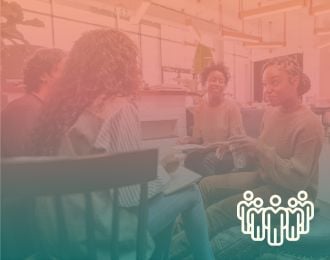
What Are the Most Effective Climate Actions I Can Take in My Community?
Learn about the surprising power of conversation and find tips for connecting with your community.
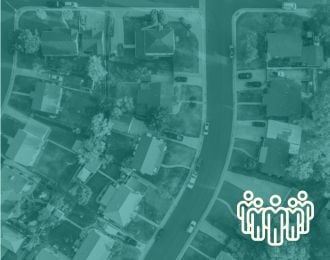
How Does Climate Action Make a Difference in My Neighborhood?
How to use your knowledge of your community to take effective action on climate.
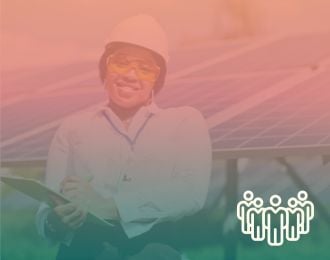
How Does Climate Action Support the Economy in My Community?
Read more about how scaling climate solutions can benefit your economy at the local level.
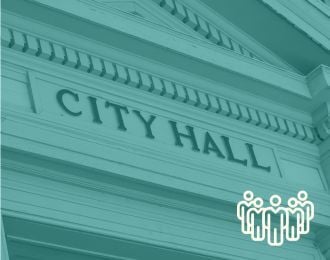
What Role Does Local Government Play and How Can I Work With Them?
Learn more about connecting with government officials who will support your goals.
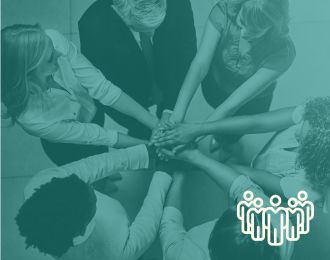
How Can I Get Others Involved and Ensure All Feel Included?
These practical tips can help you engage your local climate community.

How Can Our Community Fund a Local Climate Project?
Connect with sources of funding for climate solutions from a variety of sources.
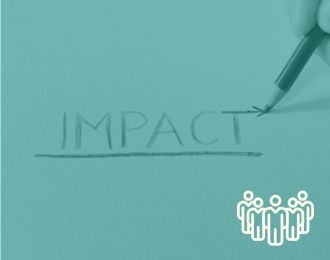
How Do I Know My Community's Efforts Are Working?
This advice can help you measure the impact your community is having at the local level.
-1.jpg)
Where Can I Find Examples and Ideas for Climate Action?
Learn from the stories of communities across Georgia that are making a difference.

Resources for Taking Climate Action in Your Community
Interested in learning more? Here are some additional resources to help you take action on climate.
What Are the Most Effective Climate Actions I Can Take in My Community?
The most important action to address climate change in your community is to talk about it. You’ll be surprised how many friends, neighbors, and family members share your concerns about climate change and/or support climate solutions – but they’re afraid to talk about it. Because they don’t hear anyone else talking about it.
You Are Not Alone
The Yale Program for Climate Change Communications (YPCCC) has been surveying Americans about global warming/climate change since 2008, publishing findings annually in the interactive Yale Climate Opinion Maps. In 2024, surveyors found that 72% of Americans believe global warming is happening, and 63% are worried about it. Support for climate policies is even stronger:
- 76% favor funding research into renewable energy
- 75% support tax rebates for EVs/solar panels,
- 73% support regulating CO2 as a pollutant, and
- 77% favor generating renewable energy on public lands
- 77% say schools should teach about global warming
Yet, despite such strong support, only 36% say they discuss global warming at least occasionally, and just 28% say they hear about it in the media. You may think national figures don’t reflect local perspectives where you live, but Yale’s interactive maps let you drill down to state, county, and congressional district data. You can generate Fact Sheets for any level. Georgians support climate solutions more than you probably think. Even in Drawdown Georgia’s 2020 public opinion research, 54% of Georgians said that the issue of global warming was extremely or very important to them.
Renowned climate scientist, author, and communicator Katharine Hayhoe references the Yale survey in her talks. Of the 63% of Americans concerned about climate change, she says: “Those are the most important people to have conversations with, and most of those people are our friends, neighbors, and family. It’s not about arguing with people.” Instead, it’s about finding common ground around climate solutions that create jobs and result in happier, healthier communities.
Drawdown Georgia is a "leader-full movement.” To be a climate leader where you live, remember you are not alone. Nearly two-thirds of the people in your community are likely to have some level of concern about climate change. But even more – roughly three-quarters – favor policies that promote clean energy, electric vehicles, regulating CO2 emissions, etc. So, lead with solutions to find friends and neighbors ready to work with you.
Grow Your Movement One Conversation at a Time
Starting out with a small group, focus on supporting each other. By listening to concerns, exploring doubts, validating fears, and sharing our dreams for ourselves and the community, we build the trust necessary to grow our impact.
As you bring climate solutions into your own life – by buying an EV, installing solar panels, taking steps to improve your energy efficiency, redoubling your commitment to recycling or composting, etc. – you gain experience to help others. On your own, or as part of a group, you can share lessons learned and become a resource for others. Rather than downplay the challenges you faced, talk about them honestly. Let people know if it was hard, but also show them what you gained that made the journey worthwhile. Share tips to help others find an easier path to success.
Joining with others in your community to start or expand a climate action group builds a channel to reach more people with your story. You can share lessons learned, develop best practices, and establish communities of practice that can help new adopters through the journey. That’s how we scale climate solutions in the places where we live.
How to Make Connections and Build a Local Climate Group
To connect with people in your community and start a climate advocacy group, the best way to start may be to look for local chapters of major organizations, attending or hosting community events, and using digital platforms tailored to climate action. Many successful climate advocates begin by joining established networks and collaborating with like-minded individuals locally.
- Find Local and National Climate Groups - Check if established organizations like 350.org, The Climate Reality Project, Sunrise Movement, Sierra Club, or Citizens’ Climate Lobby (CCL) have local chapters near you. These nonprofits provide plug-and-play support, training, and connections to fellow climate advocates. If there is no local group in your area, these organizations often provide guidance and materials for new founders.
- Start or Join Events and Workshops - Host or attend climate advocate workshops in your community to meet others interested in climate solutions and learn effective advocacy techniques together. You might plan community events such as public forums, climate solution discussions, or volunteer actions. Use flyers, local newspapers, libraries, and social media to invite participation.
- Use Digital and Social Media Platforms - Create a presence on social platforms and local digital forums to help potential group members find you. Facebook Groups, Meetup, and Nextdoor offer ways to connect with neighbors for shared climate action. You can also use local news outlets or community message boards to share calls to action and meeting information.
- Collaborate and Build Alliances - Identify community leaders, organizations, and potential allies (such as schools, faith groups, and local businesses) who might support climate action in your community. Also consider participating in town halls, city council meetings, or environmental justice forums to network and raise awareness for your group.
- Define Goals and Engage - Set your group up for success and get members on the same page by setting clear, ambitious but realistic group objectives—whether education, advocacy, or local projects—and invite others to help brainstorm and shape actions.
By following these steps and tapping into existing networks, you can build a climate advocacy group that is cohesive, effective, and truly rooted in your community.
What Goals Should Our Georgia Climate Group Set?
The Drawdown Georgia Climate Solutions Framework can be a great starting point for inspiration on the various climate solutions your group can choose to prioritize.
The 20 Drawdown Georgia climate solutions were chosen by the Drawdown Georgia research team, which took the work of Project Drawdown and analyzed 100+ identified GLOBAL climate solutions through a Georgia lens. The result, released publicly in October 2020, was a set of 20 market-ready, high-impact solutions with the greatest potential for immediate impact in our state by 2030.
The Drawdown Georgia team examined climate solutions with all 159 Georgia counties in mind, so your group should leverage your expertise about your community to choose priorities that will have the greatest impact and the greatest chance of success in your area.
We Are the Ones We’ve Been Waiting for
Use your voice and encourage others to use theirs. If, as the Yale survey suggests, the media isn’t reporting often enough about climate, you do that. Write letters to the editor or offer to contribute a regular column to your local newspaper. Even readers who accept that climate change is happening and believe it is human-caused may still perceive the threat as distant from them. Connect the dots and bring the risks and solutions closer to where they live.
That’s the role you can play in your community. Taking the news of the day, highlighting the climate connections, and making it relevant to readers where you live. Connecting the dots.
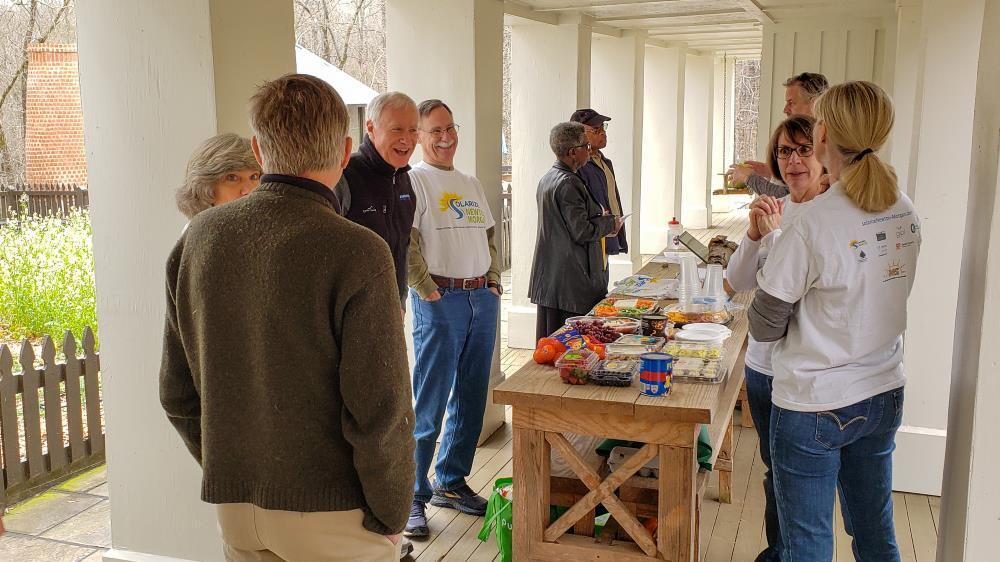
How Does Climate Action Make a Difference in Georgia Neighborhoods?
The Drawdown Georgia tagline says: “We’re bringing climate solutions home.” Like the Drawdown Georgia research team, as climate activists, our job is to bring climate solutions even closer to home by determining the best fit and greatest opportunities for impact in the places where we live. We are the catalyst for the changes that can transform our own communities.
Not an Expert on Climate Solutions? You Are an Expert on Your Community
Most of us are not climate scientists or policy experts. We’re still learning about rooftop and utility-scale solar, electric vehicles, cogeneration, demand response, retrofitting, recycling, climate-smart agriculture, EVs, etc. But we don’t need to be experts. Real progress comes from pairing exposure to climate solutions with the most essential ingredients we each bring to the table: an understanding of our community, awareness of its needs, and a role as a trusted voice to others. We can each be a sincere, optimistic, solutions-oriented voice pointing towards a better vision for our community’s future.
Thankfully, the world has thousands of smart climate scientists, inventors, engineers, and policymakers who can build solutions at a global scale. But only you and those you’re working with in your community know what will work and how to get it done where you live.
Using the other Drawdown Georgia Toolkits, you can bring the “how” and the “why” of electric vehicles, energy efficiency, composting, rooftop solar, plant-based diets, composting, recycling, and active transportation to your community. But it is you who can best determine “where” these solutions can apply. Local climate action organizations build the bridge between the potential of solutions and the value of results achieved by finding the places where solutions take root, grow, and flourish.
The folks at Project Drawdown recently released another very helpful resource with the Drawdown Explorer, which puts over 100 climate solutions and thousands of hours of analysis by scientific experts from around the world at your fingertips. In addition to data about the global impact potential for each solution, the Drawdown Explorer gives you their assessment as to how important each solution is right now, today, ranking them as “highly recommended, worthwhile, keep watching, or not recommended.”
You’ll want to start, though, by looking up the 20 solutions Drawdown Georgia researchers found most impactful for Georgia.

How Does Climate Action Support My Community's Local Economy?
The clean energy economy has been tremendously positive for Georgia and in communities across the state. In March of 2025, the Georgia Chamber of Commerce shared this data on the economic impacts of clean energy in Georgia:
- Clean energy jobs in Georgia: 82,163
- Georgia ranks 15th in the nation for green jobs
- Our state has a 4.9% growth rate annually for clean energy jobs
Additionally, the chamber reported the following statistics on clean energy investments and revenues:
- $31.3 billion in nation-leading investments for EV-related industries
- $36.7 million in property, state, & local tax revenues generated from clean power projects
- $23.6 million of income to farmers, ranchers, and private landowners via clean energy projects
This kind of data can help you make a compelling case for clean energy to your local business community. Look for chances to share these statistics with your local chamber of commerce, emphasizing the sources of the data. Show them that climate solutions are green in more ways than one.
With Focus, We Can Bring Climate Solution Benefits to All Georgians
Most climate solutions have positive economic impacts at the point of implementation, saving households, businesses, and local governments money in the short or long run. For someone acquiring rooftop solar through a traditional purchase and install contract, the energy savings should be enough to pay for that system, achieving ROI in less than 10 years – sometimes as little as five years. For the community as a whole, homeowners face a lower energy cost burden, businesses become more profitable, and local governments and non-profits can expand services.
In the “Beyond Carbon” portion of their research, the Drawdown Georgia team measured positive, neutral, and negative effects of each of the 20 solutions in areas outside of greenhouse gas reductions, specifically looking at the economy, equity, public health, and the environment.
Their economic analysis looks more closely at the ways in which each climate solution can have a positive or negative impact on the local economy and jobs, prices, opportunities for skilled labor, wages and benefits, property values, and infrastructure impacts.
As mentioned earlier, climate solutions can often lower costs for households. But access to those benefits often depends on the ability to afford the up-front costs of solar panels, an EV, or an electric heat pump. The Equity lens of the Beyond Carbon analysis identifies where special focus is required to ensure everyone in your community has access to the benefits. As the research team found, “Successful climate solutions lift people up, ensure that all communities are at the table, and deliver benefits to those who are under-resourced. Focusing on equity ensures that community concerns are addressed and advantages widely shared.”
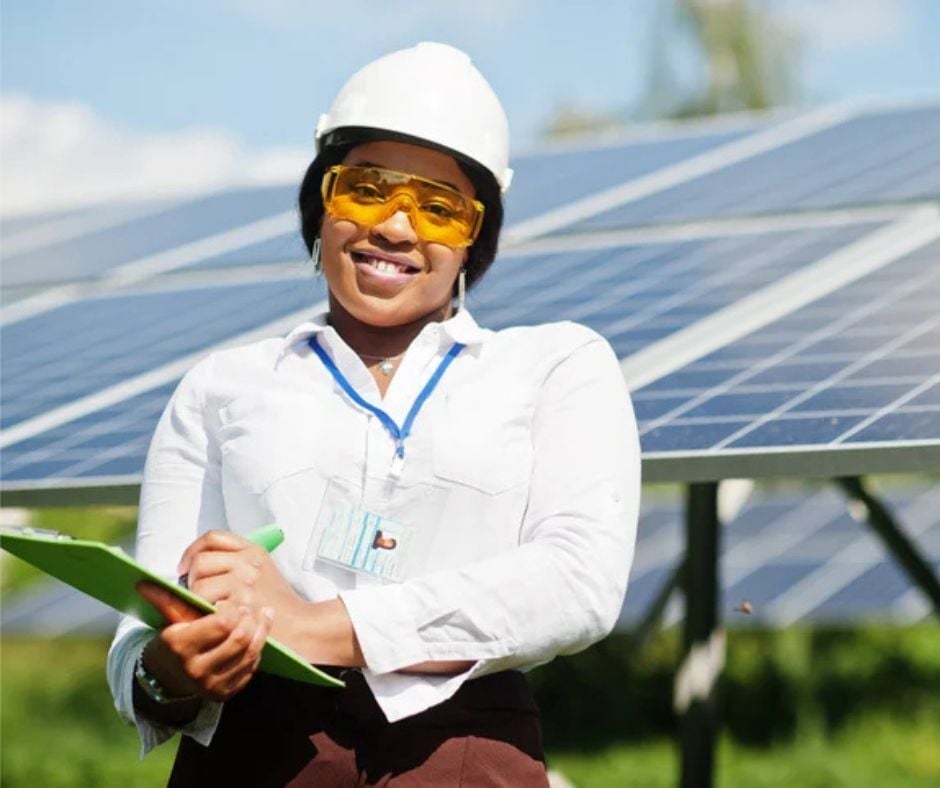
What Role Does Local Government Play in Climate Action, and How Can I Work With Them?
Local governments have one of the largest footprints in the community for employment, land use, buildings, equipment, and vehicle fleets. Local governments consume significant quantities of energy and water, while generating considerable greenhouse gas emissions and solid waste. Persuading them to pursue clean energy or zero-waste objectives can make a huge difference for your community overall.
Build a Vision, Set Goals, Make Plans, & Act
In Georgia, governments in Atlanta, Athens-Clarke County, Augusta-Richmond County, Clarkston, DeKalb County, and Savannah have committed to achieving 100% clean energy in government operations by a chosen target date. Some have also committed to community-wide clean energy objectives. A number of Georgia communities are also taking steps to divert solid waste from landfills and move towards a “zero-waste” future.
To get local traction, you need a champion – an elected official or someone in a high-ranking staff position who will stand with you to advocate for sustainability or climate action goals. There are many ways of identifying potential climate champions in your local government, such as:
- Use networks like Path to Positive Communities, which lists proactive mayors, business leaders, faith and health advocates working on climate solutions.
- Search local news, city, and county commission websites, and social media for mentions of climate or environmental programs and the leaders associated with them.
- Attend city council, school board, or public forums about climate, health, energy, or sustainability issues—speakers and active participants are often local leaders in these arenas.
- Research elected officials’ voting records and public statements.
- Use official legislative or government websites to access voting histories, sponsored bills, and public statements regarding sustainability, renewable energy, or climate preparedness.
- Write, call, or meet with your representatives to directly ask their stance on climate action—personal meetings can reveal true priorities and commitment.
If you are part of an already established climate group, writing letters to the editor of local newspapers and asking questions of candidates at election time are also effective techniques for growing support for clean energy and waste reduction. You can also host a candidate forum or solicit written answers to a set of questions posed to all candidates. Let current and would-be officials know that climate policy matters to their constituents
Equip Yourself with Facts and Be Ready to Share
Use available data to demonstrate the need for climate solutions and the existing public support. As mentioned earlier, you can use the Yale Climate Opinion Factsheets to show local officials how many people in your community or congressional district support climate solutions. Show them the percentage of people who say “Local officials should do more to address global warming.”
You can also use the Drawdown Georgia Greenhouse Gas Emissions Tracker to share how your county or city compares to the rest of the state – including a local comparison against neighboring counties in the quarterly County Snapshots. The tracker website even includes a section on helping policymakers use the trackers.
Understand How Local Governments Encourage or Discourage Climate Action
Local governments aren’t just consumers with carbon and solid waste footprints; they also set policies that can make it easier or harder for residents and businesses to implement climate solutions.
Because municipal electric and gas companies are not regulated by the Georgia Public Service Commission, local city councils set policies for these utilities. And those are not always supportive of renewable energy projects, as members of the climate action non-profit Sustainable Newton learned during their 2019 Solarize Newton-Morgan campaign.
The three electric cities in Newton County (Covington, Oxford, and Mansfield) had electric rate tariffs that charged residential customers a “standby fee” of ~$32/month if they installed distributed energy generation and were connected to the city grid. This fee eroded the financial case for rooftop solar with customers of these utilities.
Through an organized campaign, Sustainable Newton persuaded the Oxford City Council to eliminate their standby fee and the City of Covington to significantly lower theirs. These types of policy interventions are an important way of removing barriers to enable households and businesses in your community to implement climate solutions.
Electric vehicle adoption is another area where working with local governments can inspire them to install their own public EV charging stations to serve residents and visitors and make it easier for people to “drive electric.” The Electric Mobility and Energy program at the University of Georgia assists local governments with planning services, resources, and training to help communities access the economic and environmental benefits of clean transportation. Connecting your local officials with these resources is an easy way to promote electric vehicles in your community.
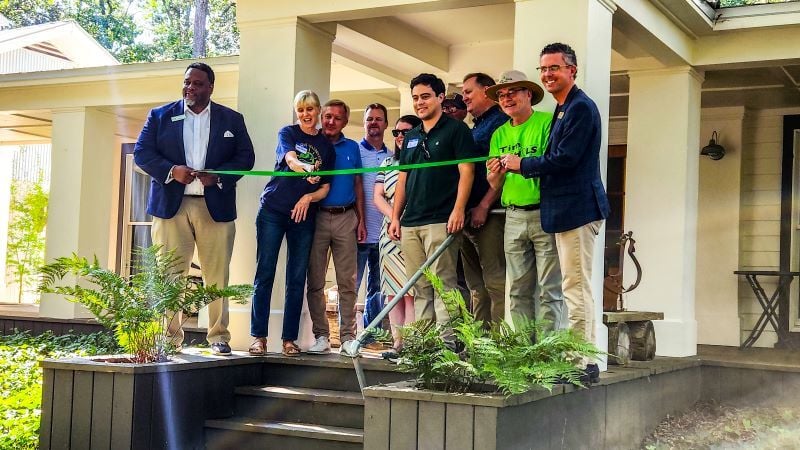
How Can I get Others Involved in Local Climate Work and Ensure Everyone in My Community Feels Included?
As we said up front, start your local climate action group with the people you know. Find out who is concerned about climate change and/or passionate about embracing climate solutions. But that approach doesn’t automatically lead to a broad-based movement with participation from across the community. For that, we have to grow our group deliberately so that everyone feels included and our message resonates everywhere.
Virtual or Face-to-Face? Yes and Yes.
With the proliferation of social media platforms and digital communities, internet-based communications are an important part of growing your base. But they can’t fully replace the traditional outreach through civic groups and clubs, churches, homeowners’ associations, and word of mouth.
Even with the broad reach of social media platforms and online neighborhood networks like Nextdoor, you may have significant blind spots in the geographic and demographic reach of your digital communication strategy.
Ask For Help to Assess How You’re Doing
When Newton County-based nonprofit Sustainable Newton wanted to evaluate their reach and adjust their digital strategy, they worked with the Partnerships Program at the Yale Program on Climate Change Communications and a Capstone Project Team from the University of Georgia’s Interdisciplinary Certificate in Sustainability Program to survey their followers across all their digital platforms using the Six Americas framework developed by the Yale program.
Keep Climate Action Practical and Accessible
As their final deliverables, the students presented Sustainable Newton board members with a report of findings and a communications strategy for moving forward. A key takeaway from the report was that a large percentage of group members already understood the urgency of the climate crisis and were looking for concrete, practical solutions.
Making your friends and neighbors feel fear and alarm is not the goal. Successful community efforts help residents take action and connect with experts and early adopters who can help each other apply climate solutions at home and in their communities.
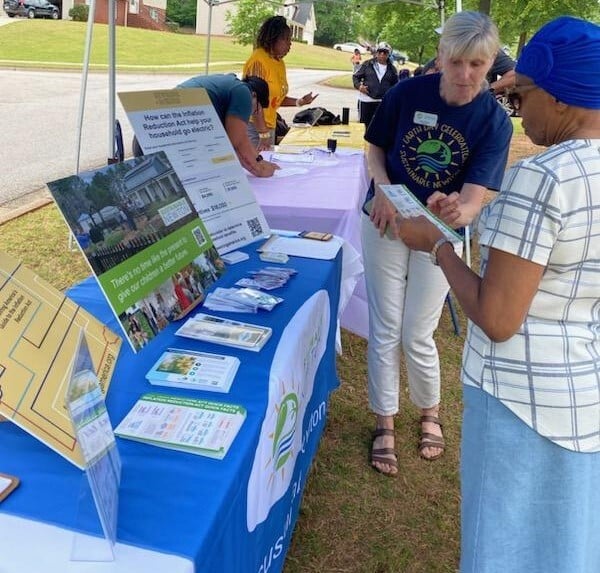
How Can Our Community Fund a Local Climate Project?
Collaborate with Local Governments to Find Funding
If, as discussed earlier, you have established a good working relationship with one or more of your local governments, there are grant opportunities available for local governments and non-profit organizations to apply for in partnership. In our state, many of these flow through the Georgia Environmental Finance Authority (GEFA). To see the kinds of projects they have funded and find out which communities have received funding, visit GEFA’s press releases page. Subscribing to the quarterly GEFA newsletter is also a good way to stay informed about new grant opportunities.
Many cities and counties have grant writers whose job is to find and apply for available government grants. Find out if your local government has a grant writer and get to know him/her. You can be a resource to them in identifying new funding opportunities, and your ability to partner will increase the community’s odds of winning competitive grants.
Leverage Non-Profits that Support Your Causes
It’s always worth researching local nonprofits and foundations that can provide funding to support climate work in your community. Here are a few examples of statewide sources of funding:
- One helpful resource to find grant opportunities in the clean transportation space and even receive technical assistance with applying is the non-profit Clean Cities Georgia. You can subscribe to updates on their website. (Verify if your local government is a member.)
- The non-profit Go Georgia (formerly Georgia Bikes) provides similar services to assist local governments with finding and applying for grants associated with active transportation (including walking, biking, mobility assistance, and connections to transit). They also provide planning support.
- The AARP Community Challenge is an annual “quick-action” program providing small grants for projects that improve livability in American communities.
Tap Into Support from Corporations Invested in Your Community
Corporate grants and sponsorships are also a great avenue for tapping into funding for climate action projects in your community. Most larger corporations have some sort of grant program for the locations where they have major facilities. In 2024, the local climate action non-profit Sustainable Newton used a $50,500 grant from the Meta Community Action Grant Program to install rooftop solar for a non-profit early childhood learning center in the community.
Companies with a significant presence in your community that put sustainability at the center of their brand image and messaging are a great place to start. Take a look at the companies that have joined the Drawdown Georgia Business Compact, then see which ones have facilities in your community. Research those companies to find out more about their philanthropic programs.
Leverage your local chamber of commerce and the economic development office or agency in your community. Industrial recruiters love to recruit clean industries in emerging technology fields because of the prestige and higher-paying jobs they bring. Make friends and allies. Ask those offices to help you connect with existing industries and new companies announcing plans to build. Then use those relationships to recruit sponsors and partners for the work you are doing.
Expertise and Insights Don’t Have to Be Expensive
Aside from all of these ways to seek funding for climate action projects, there are sometimes ways to get important work completed without funding. Some universities in Georgia have learning programs where students solve real-world problems for a business, non-profit, or local government as part of earning their certificate or degree.
A great example of this is the Sustainable Business Consulting Practicum in the Ray C. Anderson Center for Sustainable Business at Georgia Tech’s Scheller College of Business. In this particular project, students worked for a business – Creature Comforts Brewing Co. – but the program also welcomes project ideas from non-profits and local governments. You just need an idea that is compelling for the students and achievable within a 12-week semester. If you have ideas, email the center’s Managing Director to find out how to pitch your project to one of his classes.
The University of Georgia features a similar program with the Interdisciplinary Certificate in Sustainability Program, in which teams of students complete a Capstone project to satisfy requirements for the program. You can learn more about the program and how to submit a project proposal on the program website.
The Carl Vinson Institute for Local Government at the University of Georgia provides technical assistance and training for local governments in Georgia seeking to leverage public/private partnerships to expand e-mobility in their communities. Their Plug Into Georgia: EV Charging Funding and Partnerships Webinar held on February 5, 2025 is available for replay.

How Do I Know My Community's Efforts Are Working?
For starters, look around you at the climate solutions visible in your community:
- EVs on the streets
- New public EV charging stations where you live, work, or play
- People walking or biking to work, school, or errands
- Solar panels on rooftops and in fields
- Curbside recycling bins at the ends of driveways
- Recycling or composting bins in public places
- Utility companies offering incentives for clean energy upgrades or energy efficiency measures
- Local non-profits offering classes in composting, plant-forward diet, and food waste reduction
- An increase in farmers markets promoting locally grown produce and goods
- Community tree-planting efforts around Arbor Day or other times of year.
Take stock of the conversations around you. Are more people talking positively about climate action and asking about climate solutions? Are climate solutions and climate policies being discussed by your local governments? Are they coming up in your local newspaper? Do you see environmentally-focused student groups forming in your K-12 schools and local colleges and universities? Are civic groups in your community taking action in environmentally positive ways?
These indicators may be more anecdotal than objective, but they’re all positive signs your community is moving in a good direction.
Leverage Measurable Data Where You Can Find It
If you’re seeking quantifiable measures, the most comprehensive place to look would be the Drawdown Georgia Solutions Tracker, where you can find statewide progress data on 16 of the 20 Drawdown Georgia climate solutions. And you can drill down to see how your county ranks in terms of multiple key measures of adoption.
EV Resources in Georgia
For easy access to data about the growth of public EV charging where you live, third-party websites and apps like Plugshare and Chargeway that help drivers find public EV charging stations are a good way to assess how robust the charging infrastructure is in your community. And you can watch it grow.
The Carl Vinson Institute for Government at the University of Georgia recently assembled and published a Georgia Electric Mobility Snapshot that includes statewide and county-level data on consumer EV adoption, charging station buildout, economic impacts of e-mobility, and trends across a number of key metrics. You can email the Electric Mobility and Energy Team to inquire about specific data for your community.
Rooftop and Large-Scale Solar Resources in Georgia
To find out how many residences and businesses have installed rooftop or ground-mounted solar energy systems in your community, you may be able to work with your local city or county planning and zoning department to get permitting data on the number and size of systems installed within a particular time period.
Recycling and Reducing Waste Resources in Georgia
You can also talk with your county’s landfill or solid waste manager to gauge the effectiveness of efforts to reduce or divert solid waste from the landfill.
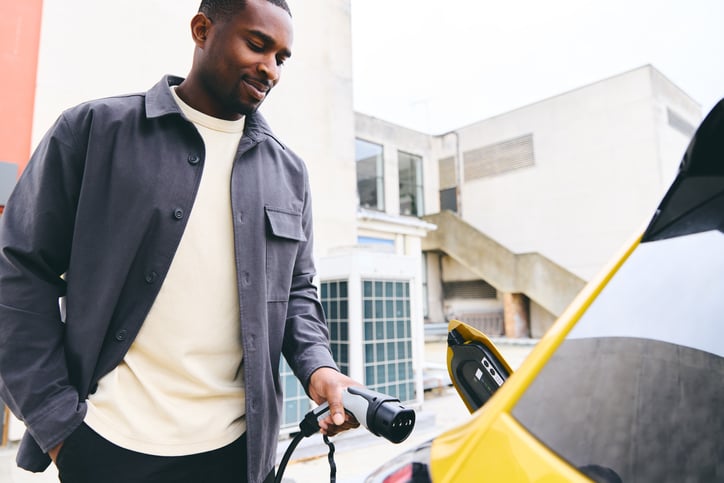
Where Can I Find Examples and Inspiration?
Leverage Drawdown Georgia to Learn from Those Who Came Before You
Since 2023, Drawdown Georgia has partnered with like-minded organizations to provide funding for equity-focused climate solution work through the Drawdown Georgia Climate Solutions & Equity Grant. The list of past winners provides a long list of projects and programs that may inspire you to make a really special, transformative impact in your community.
The Drawdown Georgia Blog brings an endless stream of inspiring, insightful content about climate action in Georgia:
- Learn about faith communities making worship spaces greener
- Georgia businesses, large and small, are coming together to solve climate challenges
- Communities capturing landfill methane to keep it out of the atmosphere and put it to use as energy
- A community non-profit addressing food waste and promoting a plant-based diet by transforming excess produce from local farms into plant-based, ready-to-eat meals for those who need them.
To never miss a story, subscribe to the bi-weekly Georgia Climate Digest newsletter.
Strength in Numbers – It’s About the Company You Keep
To reenergize your passion for climate action and deepen your sense of belonging to a movement much larger than just you, find opportunities to immerse yourself with other climate leaders. The Ray C. Anderson Foundation, which founded and funded Drawdown Georgia, created such an opportunity for many years by hosting their annual RayDay event to celebrate Ray’s legacy and inspire collaboration among Georgia’s most impactful climate action organizations. A blog post from one of those organizations, Sustainable Newton, describes how Ray’s use of the phrase “Brighten the Corner Where You Are” from a hymn he sang as a child inspired them to find even deeper purpose in their climate work.
The Georgia Climate Project convened statewide conferences for several years, bringing together scientists, researchers, policymakers, advocates, community organizers, and solution builders from across Georgia. You can read about past gatherings and watch for future plans on their website. The Georgia Department of Natural Resources has also convened statewide conferences through the years, now known as the Georgia Resiliency Conference.
Learn from Others & Let Their Stories Inspire You
The Southern Alliance for Clean Energy focuses on electric transportation, energy efficiency, solar power adoption, and utility decarbonization within the eight states making up the Southeastern Region. The spotlights they shine on individuals, groups, and entire communities acting on climate are often quite inspiring and insightful.
In Drawdown Stories, Project Drawdown curates features from around the world, leveraging storytelling and engagement as a bridge between science-based climate solutions and everyday people seeking their role in stopping climate change.
Generation180 inspires climate action through storytelling about ordinary, relatable people choosing clean energy and inspiring others to go electric too. And they use climate comedy to show how climate discussions can even be fun.
Start small wherever you can act. But never stop asking, “Who else isn’t here yet that might help us?”
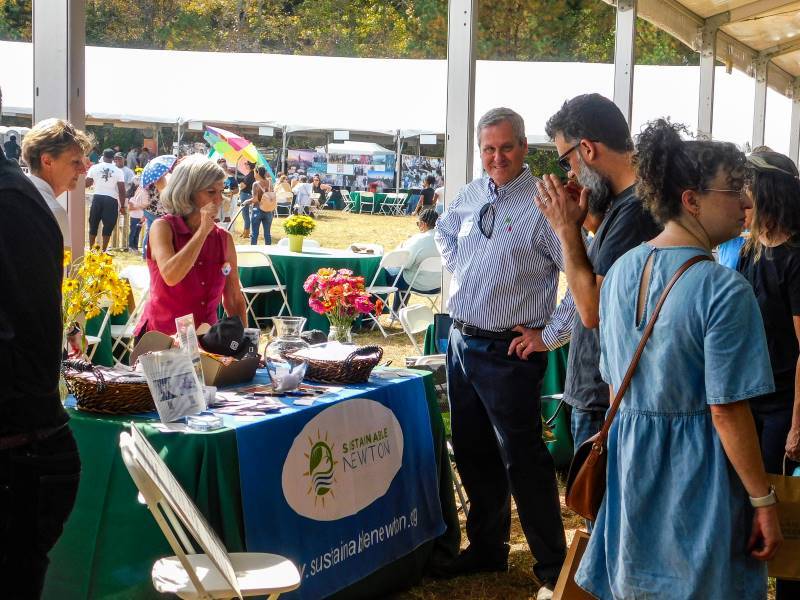
What Resources Can Help Me Take Action?
Some of the resources below were referenced earlier in this toolkit, while others are additional material to help you understand, explain, and act on climate challenges and opportunities. We’ve organized them around the ways they can help you.
Implementation & Progress Tracking Resources:
- For practical advice on adopting Drawdown Georgia solutions &/or deploying them in your community – see the Drawdown Georgia Climate Solutions Toolkits.
- You can find detailed information on a broad spectrum of climate solutions from the new Drawdown Explorer platform published by Project Drawdown.
- For real data on emissions and reductions in Georgia or a particular county or city.
- Interactive Greenhouse Gas Emissions Tracker – State & County-Level Data
- Interactive Greenhouse Gas Emissions Tracker – City-Level Data
- Subscription-Based Quarterly County Emissions Snapshots
- Drawdown Georgia Solutions Tracker
- Georgia Interfaith Power & Light is a great first stop for communities of faith looking for help to organize, implement practical climate solutions, and advocate on issues of climate change, environmental justice, and community resilience.
- The University of Georgia Extension Service provides excellent resources on a number of ecological and agricultural topics. Many counties even have an extension service agent assigned to work with them locally, and these agents can help put together education and workshops on topics like composting, climate-smart agriculture, and growing local food.
- Rewiring America is a one-stop shop for homeowners or renters looking for help electrifying their homes, transitioning to clean energy appliances and vehicles, and improving energy efficiency. They can help you boost those programs in your community.
Resources for Improving Climate Communications:
- From the Yale Program on Climate Change Communications, these are all useful resources:
- The non-profit Climate Central provides localized content you can subscribe to for communicating with your community about climate change. Most of their visuals can be tailored to the cities in or near your community.
- Climate Matters – seasonal and news-driven reporting, often with localized graphics & explainer videos.
- Climate Shift Index – real-time tools for showing how climate change is causing higher land and ocean temperatures, as well as impacting extreme weather. You can also subscribe to alerts for cities in your area.
- See the Sustainable Newton Instagram profile for examples of a community-based organization in Georgia using the Climate Central content for social media posting.
- For professional marketing tips, insights, and free content you can download and reuse, see Potential Energy. Their collection of insights, reports, guides, and tools can help you find different ways to reach people in your community with impact and engagement.
- Access material and insights for reaching moms, grandmoms, and all parents or grandparents with messages that resonate by following Science Moms.
Resources with a “Beyond Carbon” Focus
- Georgia Clinicians for Climate Action focuses on educating voters about issues at the intersection of climate and public health.
- Georgia Conservation Voters’ Education Fund provides leadership, training, and education on clean energy and environmental justice.
- For resources related to air pollution monitoring, electric school buses, and other clean air issues, check out Mothers & Others for Clean Air.
- Sustainable Georgia Futures offers climate justice training workshops and renewable energy workforce development opportunities targeting BIPOC communities.
- For policy briefs and activism through the lens of moms concerned for their children’s health and well-being, see Mom’s Clean Air Force.
Resources To Grow Your Understanding of What’s Going on with Climate Science, Solutions, & Action:
- Katharine Hayhoe’s Talking Climate newsletter delivers a weekly dose of good news, not-so-good news, and what you can do about it from the world of climate science.
- Drawdown Explorer from Project Drawdown brings you detailed facts and analysis for over 100 climate solutions, identifying the ones recommended most highly vs. the ones best put aside for now.
- The Climate Brink from Andrew Dessler puts the latest climate science into words and pictures we can all understand.
- Carbon Brief provided daily and weekly updates, plus in-depth analysis on the science of greenhouse gas emissions.
- Climate Data Scientist Hannah Ritchie publishes insightful reports through the Sustainability by Numbers newsletter.
- Our World in Data - CO2 & Greenhouse Gas Emissions brings together data, visualizations, and writing on CO2 and other greenhouse gas emissions from a global and country-level perspective.
- In his Distilled newsletter, Michael Thomas communicates data-driven analysis to “help readers cut through some of that noise and better understand the problem and potential solutions to the climate crisis.”
- Reports from the Southern Alliance for Clean Energy give you a clearer view of clean energy progress and roadblocks closer to home within our region.
- Yale Climate Connections publishes climate journalism from an independent perspective, funded by individual donors. You can subscribe to their newsletter for daily updates.
- Electrek delivers the latest tech news from a variety of clean energy fields, including transportation electrification and green energy.
- Grist is a nonprofit independent news organization reporting regularly on climate solutions and equity. You can subscribe to regular newsletters on various topics.
- Canary Media is another independent, nonprofit newsroom covering the transition to clean energy and solutions to the climate crisis. Their stories relay how the world is decarbonizing electricity, transportation, buildings, and industry — with an emphasis on learning what works and what doesn’t.
- World Weather Attribution is a science-based non-profit studying and reporting on the ways in which scientists can establish causal links between extreme weather events around the world and climate change.
Meet the Expert
This toolkit was written by the experts at Sustainable Newton.
Maurice Carter
Co-Founder + President
Sustainable Newton


